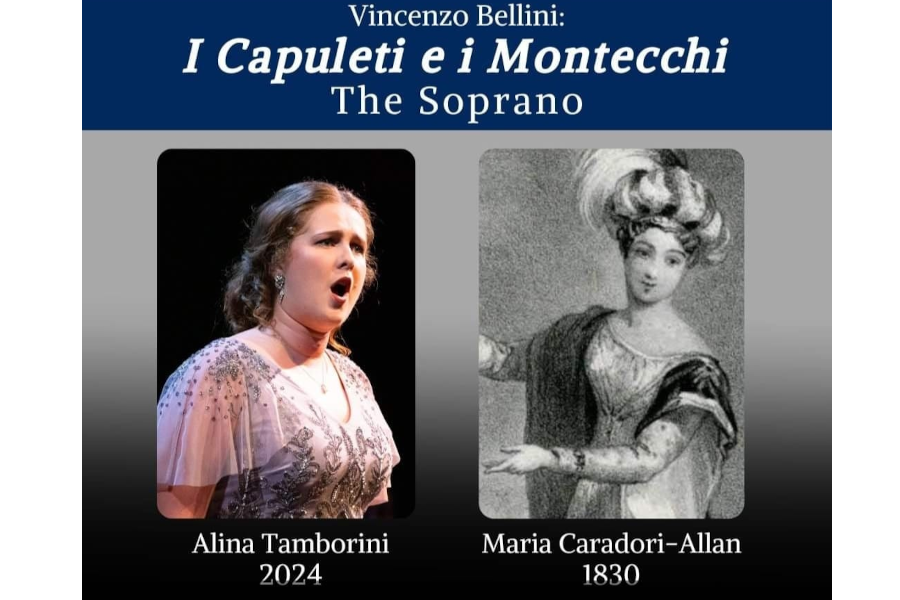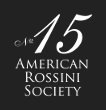Interview with Soprano Alina Tamborini

Alina Tamborini who will be appearing again with Teatro Nuovo in July kindly agreed to an interview for the American Rossini Society Newsletter. We are happy to present it here as we think it may be of interested to a broader audience than simply members of the ARS. Although she is not singing Rossini in this season of TN, she has appeared in Rossini roles and clearly has some future Rossini roles on her wish-list!
What sparked your interest in opera? Many singers mention music in their home, participation in choruses, and things like that.
My interest in opera began in college, but my love of music started way before that. I’ll circle back to opera, but let me give you a bit of context first! My parents enrolled me in music classes at the Michigan State University Community Music School when I was an infant/toddler. These classes were crucial in shaping my early musical development. Fun fact: I ended up teaching those same classes 20 years later when I was a music education major at MSU. I’ve always been drawn to music; like many musicians, I took piano lessons as a kid. However, the specific instances my family pointed out that hinted at my future as a musician were when I’d press my face as close as possible to the big speakers connected to our record player at home. I’m so grateful I didn’t damage my ears!
Skipping ahead a bit past the endless hours of singing princess songs, I started out as an oboe player in band and orchestra with choirs and musicals also playing a pivotal role in my musical journey. I found a great group of friends who were talented musicians and gave me insight into the music world. When I got to MSU for oboe performance and vocal music education, I saw a production of Sondheim’s A Little Night Music performed by vocal performance majors. I was hooked from that moment on. The next semester, I sang in the chorus for The Magic Flute and La Bohème, and that’s when I really felt the pull towards opera. I loved the oboe, and I credit much of my success as a singer to my experience playing it.
My first opera role was Despina in Mozart’s Così fan tutte. I probably had no business tackling that much Italian at the time, but I thought I was doing great! I’m only mildly embarrassed every time I go back and watch that performance, but it is a great reminder of how far I have come! Thankfully, my mentors during college, grad school, and Teatro Nuovo helped guide me through my journey and shape me into the singer I am today.
You recently appeared in Il Signor Bruschino at Bronx Opera where you sang the role of Sofia – in English! How much of a challenge is it to sing Bel Canto in English? Do you, as a singer, have any input in the translation (i.e., where words don’t really fit the music)?
Singing Bel Canto in English isn’t necessarily more challenging than in other languages for me, but singing in English generally has its own set of challenges. Conveying emotion and acting is fine; it’s keeping consistent technique that’s tricky. When I learn a role in English, especially one not originally written in English, my singing sometimes starts to sound too much like my speaking. Sure, the vowels change occasionally, which can make a line feel less comfortable. Typically, I learn any fluid passages on a vowel, ideally the one in the original score. Sometimes the vowels and consonants can make the line a bit difficult, but the intent remains the same! Despite its challenges, I actually enjoy singing in English! That said, I do prefer singing music in its original language. It’s hard to find a language as comfortable for the voice as Italian.
When I’m singing translations, I don’t usually have much control over the words, but directors are often receptive to advice. The folks at Bronx Opera love input. They even write many of their translations themselves! Creating an English translation must be an exciting challenge. These Italian libretti are poetic gold mines!
You have quite a diverse repertory and although your appearances seem to be mostly in the “greater NYC area,” you apparently have performed in China! What was that like?
Performing in China was probably the most memorable musical experience of my life! MSU has a wonderful relationship with the Beijing Conservatory of Music. They do an exchange program every year where we spend a week at each other’s institutions. I was lucky to be part of their 10th anniversary, which meant instead of fantastic recitals, we were doing full operas. The concert was a double bill of a Bernstein revue and The Savage Land, performed in Mandarin. Each show was double cast in America and China, with the casts mixed once we got there. Singing in Mandarin would have been amazing, but I was thrilled to share my love of Bernstein with my Chinese colleagues. The Chinese opera singers were fantastic hosts, and we learned so much from them about music, their culture, and of course, their food! Equally exciting was bringing them to our campus and sharing what it’s like to be a music student in the Midwest! My in-laws are planning a trip back to China soon, so I’m excited to return and experience it all over again with the same awe and wonder.
Something Will Crutchfield and the folks at Teatro Nuovo taught me is that singers can, and many times should, handle a wide range of music. I’ve tried to embrace that by exploring all forms of classical music, from Purcell and Handel to Mozart, Rossini, Verdi, Britten, and contemporary operas, some of which are currently being written by my friends and colleagues. It keeps my voice and mind sharp.
Your association with Teatro Nuovo is a wonderful example of moving up the artistic ranks, advancing from Apprentice Artist in 2018 to Resident Principal Artist in 2020. What was the experience like working with such a group of dedicated musicians and coaches?
My first summer with Teatro Nuovo was overwhelming in the best way. I left every rehearsal inspired and filled with knowledge and a drive to keep devouring this art form. I had never spent so much time with so many people who knew so much about something so important to me. They are all incredibly smart. Like really truly, the smartest people I know! Even now, going into my sixth summer with them, I continue to learn so much about the repertoire, the poetry, the compositional styles, the ornamentation, the orchestras, and more. I have to give a special shout-out to the orchestra. All of the instrumentalists are in the workshops and trainings with the singers, learning about the same material. Every time I stepped into a rehearsal with that orchestra, I felt immediately comfortable. Knowing they have the same knowledge base as I do makes the creative process so much smoother, more collaborative, and more authentic. This also shows how invested Teatro Nuovo is in its artists. Every single coach, musician, director, and stage manager is deeply invested in our success.
Although you have not yet performed much Rossini (the cancellation of Il Vero Omaggio was a real loss), are there Rossini roles you would like to add to your repertory? If so, which ones, and why?
The cancellation of Il Vero Omaggio was definitely a tough loss! Maybe one day! I still use some fragments of the music to help warmup my voice. Lots of tricky sections that have helped inform other roles for me vocally. There are absolutely a few Rossini roles I would love to add to my repertory. One of the most exciting roles for me would be Armida. My coach during my undergrad presented one of her arias to me as an étude. He showed me the first line of music and asked, “Do you know this?” I said, “No.” He said, “Good, don’t look anything up and don’t listen to anything.” Armida’s aria, “D’amor al dolce impero,” has a theme, two variations, and a coda. Every few weeks, once I felt comfortable with one section, we’d add a new one. It was the first time I delved into the intricacies of bel canto music, the first time I sang neighbor-tone triplet figures, the first time I sang in chest voice, and the first time I ornamented anything beyond a few turns in Mozart arias. It’s the piece I spent the most time learning, so I’d love the chance to sing the role one day. Other roles I’m eager to add: Amenaide in Tancredi, Ninetta in La Gazza Ladra, Mathilde in Guillaume Tell, and Clorinda in La Cenerentola. I fell in love with Tancredi and La Gazza Ladra at Teatro Nuovo.
You will be appearing in Teatro Nuovo’s I Capuleti e i Montecchi as Giulietta with Jakob Lehmann conducting. Bellini is, of course, known for his exquisite melodic lines. Does this require even closer collaboration/trust with a conductor than usual?
Yes, absolutely! Thankfully, I have unending trust in Jakob and the entire Teatro Nuovo orchestra. I know their sound, I’m familiar with their sound, I love their sound. And I think they feel similarly towards me. Beyond familiarity with the orchestra and conductor, without a traditional stand-in-front, wave-a-baton conductor the singers are encouraged to take more control over the music. Everyone is creating collectively and listening deeply. It is thrilling! Working with a conductor like Jakob Lehmann, who understands and respects these demands, makes the process both challenging and incredibly rewarding.
